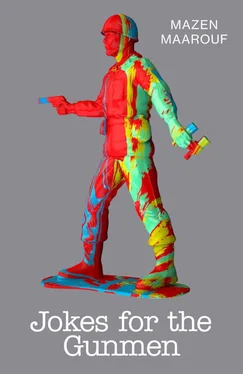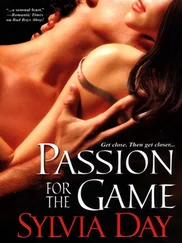When my father reached the laundry, the bodyguard disappeared from sight. But my father remained apprehensive and tense all day long and had pains in his stomach. When he set about closing up the laundry at a quarter to nine in the evening, when the television news ended, the nightmare began again and the man walked behind my father to the entrance of our building. The gunmen didn’t accost my father that day, maybe because they didn’t want any trouble with the hippopotamuses. The next day my father didn’t leave the house. He didn’t even leave his room. He didn’t look out of the window till noon, and the hippopotamus wasn’t there then, which reassured him.
But the process was repeated on the third day and, halfway to the laundry, my father could no longer keep walking. He stopped and hailed a taxi. But then he found the hippopotamus sitting beside him in the back seat. ‘Have I done anything bad?’ my father asked him in a trembling voice.
‘I don’t know. I’ve been hired to escort you,’ answered the bodyguard.
‘Hired? Who hired you?’
‘Do you have a son in the first grade of middle school?’
‘Yes.’
‘He was the one who hired me.’
My father didn’t come home that day. When the hippopotamus bodyguard got to the laundry a little before 8.45 p.m., he found it shut. My mother stayed up all night waiting for my father, but there was no trace of him. I had to stay awake next to my poor mother. My eye was hurting badly and I took a tablet. But there was one idea jumping around in my head like a squirrel: was it possible my father had been kidnapped? Early in the morning, we heard knocking on the door. We thought it was Father, but when my mother opened the door she found the hippopotamus standing in front of her. He was upset that an ordinary man had managed to elude him. He asked to speak to me. ‘Listen, kid,’ he said. ‘I consider this to be breach of contract. Tell that to your father.’ Then he left.
I knew the hippopotamuses could find my father if I asked them to. It would cost a lot of money, of course. But my mother was willing to pay as much as the laundry was worth in order to get him back. I preferred to have my father out of the way for a while, because I had always wanted him to be famous for his role in the war – and this was his chance. Given that my father was out of sight, he must have been kidnapped. That was the story I would put about. That would give the impression that his kidnappers saw my father as a man of consequence, the opposite of what my mother kept saying for the neighbours to hear – that Father was innocent, that he had never even bought a newspaper, and that he had no opinion on what was happening in the country. In fact, she swore repeatedly that the gunmen were constantly beating him up and that he was a completely willing victim.
My mother wanted my father back whatever it might cost, but I never made it clear to her that we could get him back whenever we wanted by employing the hippopotamuses. At school I noticed that the kids had become more sympathetic towards me. I was now the kid who had lost his deaf brother and whose father had been kidnapped. Maybe there was another reason for their sympathy too, but I did feel relieved. I smiled all the time and was boastful, because at last my father had won recognition in the annals of the war as someone who’d been kidnapped. His picture had even been published in the newspaper, which annoyed the gunmen, who were jealous because their pictures had never appeared in any newspaper. Then his name was mentioned on television, among the names of people who had gone missing that month. Meanwhile at school, I wrote in my essays about the military plans he drew up at home, his orders to gunmen who came around to our house, and his deep and secret friendship with the hippopotamuses.
But two months after he disappeared we received a legal notification from a lawyer, informing us that my father had bequeathed me the laundry and all its equipment and coat hangers. Obviously it would have been impossible for someone who’d been kidnapped to hire a lawyer from his place of captivity, so my mother and I realized that Father was alive and well, that he hadn’t been kidnapped and hadn’t come to any harm. He had just left home of his own free will. The news hit me like a thunderbolt, but my mother’s mood took a turn for the better. The next day I didn’t go to school. I was too embarrassed. I never went back. A short while later I decided to devote my time to washing and ironing people’s clothes in the little laundry.
I NEVER SAW MY FATHER AGAIN. HE DOES CALL ME sometimes – he rings me on the laundry phone twice a week, to check up on me and my mother and to ask how business is. I answer him in a roundabout way: ‘Business is fine, Dad. I’m thinking of opening another branch. We miss you, Dad. Won’t you come and visit us?’ I beg him to tell me where he’s living. But he refuses, every time. Now he’s remarried and he has twin boys. He tells me about them and how they look like we looked, my brother and I, when we were their age. Although it’s fifteen years since he left, my father still feels ashamed. He says he feels embarrassed. ‘What a coward I was!’ he says. ‘It’s OK, Dad, in war not everyone can be brave,’ I reply. I look in the mirror while I’m speaking to him on the phone. Always. I don’t tell him that I always wanted him to have a glass eye, because that would be painful for both of us. Then he asks me the same old question, the question he never forgets in any phone call: ‘How’s your eye, your glass eye?’ ‘It’s fine, Dad,’ I reply. ‘It’s completely adapted to my face. I can even blink normally. You should see it.’ ‘That’s good to hear. It was a dire day, that Wednesday. Do you remember? You shouldn’t have stayed at school after class.’
‘Yes, Dad. I remember the day well. It really was an unlucky day. I even owe you an apology,’ I say.
‘An apology? Don’t be silly. I should be apologizing to you and your mother.’
I had stayed behind at school, determined to make an agreement with the hippopotamus about a new idea that would only take a few minutes to put into effect. After the hippopotamuses visited our class, it had occurred to me that, instead of hiring one of them as a bodyguard, I should ask them to poke out my father’s eye. When the school bell rang for the end of lessons, I couldn’t find the hippopotamuses anywhere, so I stayed behind to wait for them. Some of the kids were still in the playground. They were playing dodgeball with a tennis ball. In dodgeball two boys throw a ball back and forth and try to hit a group of boys standing half way between them. I joined them, but I wasn’t concentrating fully. As I played I was thinking about the hippopotamuses and the new plan. Suddenly the ball hit me in the eye. I lost consciousness immediately and when I came round I was in hospital. I opened my right eye and my mother and father were standing near the bed. My left eye was bandaged up, my head was hurting badly and I felt slightly dizzy. My father smiled and stroked my hair, then told me what was going to happen in a while in the operating theatre. ‘You’re a big boy and from now on you won’t be just a boy. You’ll be a man.’ Then he took something wrapped in a surgical dressing out of his pocket and unwrapped it to show a small ball. It was a plastic version of the glass eye that was going to fill the hole in my face. The iris was the same colour as my own. The whiteness was also an approximate match.
Whenever he calls me, we go over the incident together. We also remember the pepper plant. I tell him it’s grown. It only grows peppers in two places – two peppers every year. The first one always appears where it’s meant to be, representing my mother’s soul. The second one grows where the one representing my father’s soul used to be, but whenever I look at it closely I have a feeling that it carries my soul. My father tells me that he’s been dreaming about me. It’s the same dream every time, in which the doctors replace my glass eye with a natural one. They restore my real eye. Then we laugh. ‘Don’t tell me it’s the same dream again,’ I say, and he swears by his twin sons that it was the identical dream. We laugh and I wipe a tear from my good eye. I wear glasses now and they make my glass eye look bigger. It looks really frightening. Then I add in jest, ‘If war breaks out again, I’ll have a face that frightens people.’
Читать дальше












